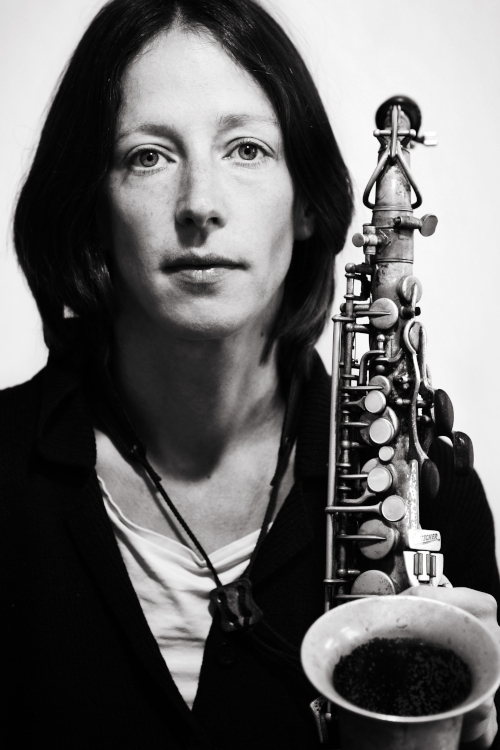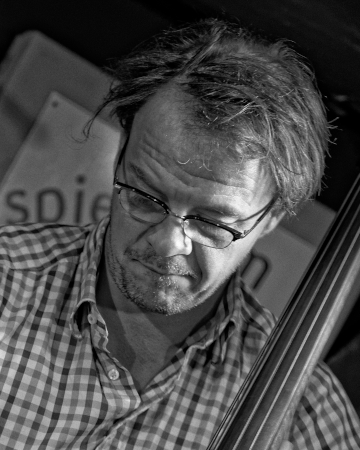Kaluza / Roder
Kaluza / Roder

the duo
Anna and Jan first met in 2004, when they started playing together in different combinations as the Kaluza Quartet (with trombonist Christof Thewes and drummer Kay Lübke) and a trio with drummer Michael Griener. In 2020 they played their first duo concert on a boat in Berlin (Hosek Contemporary) and decided to continue with their work as duo.The same year they went to Christian Betz’ studio in Friedrichshain to record their music.
contact: info[at]janroder.de

das Duo
Anna und Jan trafen erstmals 2004 zusammen, um fortan in verschiedenen Besetzung wie z.B. dem Kaluza Quartett,(mit Christof Thewes an der Posaune und Kay Lübke am Schlagzeug) , im Trio mit dem Pianisten Niko Meinhold oder dem Schlagzeuger Michael Griener und einigen anderen zu musizieren.2020 spielten sie ihr erstes Duokonzert auf einem Boot in Berlin (Hosek Contemporary) und entschlossen sich diese Zusammenarbeit als Duo fortzusetzen.
Im gleichen Jahr begaben sich die beiden in Christian Betz Studio in Berlin-Friedrichshain, um ihre Musik auch zu dokumentieren. Herausgekommen ist eine Musik, die auch den beiden Protagonisten sehr am Herzen liegt, ein intimes Zwiegespräch im Geiste des Free- und des Cooljazz zugleich.
the musicians

Anna Kaluza studierte Saxophon bei Frank Gratkowski an der Musikhochschule Köln. 2008 erhielt sie ein DAAD-Stipendium für
ein Studienjahr in London (Guildhall School / City University). Die Mitwirkung beim London Improvisers Orchestra inspirierte sie zur Gründung eines Improvisations-Orchesters in Berlin,
wo sie seit 2009 lebt und in kleineren und größeren Ensembles mitwirkt. CD-Veröffentlichungen erfolgten z.B. mit dem HANAM QUINTET (AUT records), der deutsch-polnischen Formation
Kaluza/Majewski/Mazur/Suchar (Cleanfeed) und dem Heisenberg Quintett (AUT). Sie spielt außerdem im Quartett mit Christof Thewes, Jan Roder und Kay Lübke und im großen Ensemble „New
Generation of Sister & Brotherhood“ mit Günter Baby Sommer.
Anna Kaluza, Berlin-based saxophonist studied jazz in Cologne with Frank Gratkowski, in Vienna with Klaus Dickbauer and in London with Jean Toussaint. With the German Band Futür she
released the album “Kein Schnee” in 2007 (Jazzhausmusik). She played festivals in Essen, Idstein, Leipzig, London, Hamburg, Köln, Düsseldorf, Saarbrücken, St. Johann, Sibiu, Palermo,
Heiligenkreuz… From 2008 to 09, she pursued a Master’s degree in London at City University/Guildhall School of Music and Drama (funded by the German Academic Exchange Service).
During this year she became a member of the London Improvisers Orchestra (L.I.O.) and the group Splatter and played with musicians from the not applicable network and label.
Since returning to live in Berlin she has been establishing the Berlin Improvisers Orchestra (which includes musicians from the L.I.O.) and regularly plays with international
guest musicians. She is a member of the Hanam Quintet (with Alison Blunt /vl, Niko Meinhold /p, Manuel Miethe /ss, Horst Nonnenmacher /b // 3 CDs released by AUT records),
the Kaluza Quartett (with Christof Thewes /trb, Jan Roder /b and Kay Lübke /dr), the Frankfurt-based trio Baustelle No 5 (with Julian Keßler and Johannes Held), the Heisenberg
Quintet (with Niko Meinhold /p, Hannes Buder /guit, Stephan Bleier /b, Rui Faustino /dr) and the quartet Rumble Phone Fish with Flo Müller (guit), Martial Frenzel (dr)
and Ben Lehmann (b). In 2013, the album Tone Hunting with Artur Majewski (tp), Kuba Suchar (dr) and Rafal Mazur (b) was released by Cleanfeed Records. She takes part in the recently
founded large ensemble New Generation of Sister & Brotherhood with Günther Baby Sommer.
Foto: Manuel Miethe

Jan Roder,
studierte ein paar Semester Jazzkontrabass bei Detlef Beier an der Hochschule für Musik und
Theater, Hannover und siedelte 1995 über nach Berlin. Dort traf er schnell auf Musiker wie Axel
Dörner, Rudi Mahall und Alexander v. Schlippenbach mit denen er seit dieser Zeit zusammen
arbeitet, u.a. mit „Die Enttäuschung“ und „Monks Casino“.
Seine musikalische Heimat befindet sich im (Post-)Freejazz, bzw. der “Improvisierten Musik”,
stets durchdrungen von der Tradition des Jazz.
Desweiteren spielte und spielt Roder mit zahlreichen Persönlichkeiten wie Aki Takase, Irene Schweizer, Thomas Borgmann, Peter Brötzmann, Wolfgang Puschnig, Christof Thewes aber auch Silke Eberhard Axel Dörner, Willi Kellers, Michael Griener, Kay Lübke, Matthias Schubert, Olaf Rupp, Maria Raducanu usw...
In Projekten wie Soko Steidle, Griener Roder Thewes, Derek plays Eric (am E-bass), Ruf der
Heimat, Silke Eberhard Trio, Kaluza Quartet u.v.a., als Solist und von Zeit zu Zeit als
Studiomusiker.
Er tourte in Clubs und spielte auf Festivals in Europa, Nordamerika und Asien und ist auf
zahlreichen Veröffentlichen zu hören, u.a. Die Enttäuschung / Lavaman, JR3 / Happy Jazz, Jan
Roder / Doublebass, Silke Eberhard Trio / Being the up and Down, Kaluza Roder / Am Frankfurter Tor...…
Jan Roder, born 1968 in Lübeck, Germany, plays bass and electric bass. He moved to Berlin in 1995 where he encountered musicians the likes of Dörner, Mahall, and v. Schlippenbach with whom he has played until today. Roder considers his musical 'home' to be post-free jazz and improvised music deeply rooted in the jazz tradition.
He collaborates with musicians such as Aki Takase, Gunter Hampel, Irene Schweizer, Ulrich Gumpert, Ernst Ludwig Petrowski, Thomas Borgmann, Peter Brötzmann, WolfgangPuschnig, Axel Dörner, Wlli Kellers, Michael Griener, Oliver Steidle, Silke Eberhard, Christof Thewes, Matthias Schubert, Olaf Rupp.....
and in projects such as Monks Casino, Die Enttäuschung, Soko Steidle, Squakk, Derek plays Eric (on electric bass), Silke Eberhard Trio, Ulrich Gumpert Quartett and Workshop Band, he played concerts and festivals on some continents and also works as a soloist and from time to time as a studio musician.
Foto: Alexander Schaffer
the CD


reviews
On SquidCo by Ken Waxman
A 10-part (German) alphabet-titled collection of bagatelles by alto saxophonist Anna Kaluza and bassist Jan Roder,
Am Frankfurter Tor demonstrates their in-the-moment cohesion and instrumental blending. Kaluza, who is part of the Berlin
Improvisers Orchestra and leads her own group and veteran journeyman Roder, best known for his membership in the Monk's Casino
quartet, work out a simple strategy with the saxophonist's quicksilver trills and slithering tone variations wrapping around and
stabilized by the bassist's sympathetic andante movements.
Not that this is just a series of reed exercise. Roder's arco and pizzicato facility create their own momentum when, for instance, he counters
Kaluza's shaded peeps and lyrical puffs with concentrated stops on the jaunty "Vier" or when his squeaky sul tasto introduction to her
flutter-tonguing on "Drei" is resolved with subsequent reed shading without strain as he encourages a lyrical narrative. Dedicated to exploring
every nuance of timbral color from their respective instruments, Kaluza's output includes bites and snorts, as she emphasizes multiple notes in
sequence. Meanwhile Roder's swift plucks and gritty bow slices keep up connective pressure, yet also mirror her expositions close enough to confirm
arcadian story telling or dissonant asides.
Working up to the concluding "Zehn" quick in-and-out reed breaths and cascading string thumps are gradually replaced by a bugling interlude by Kaluza
as Roder's more intense bass rebounds emphasize logical expression. Without resorting to dissonant slices or overblowing the duo cannily skirts sameness
by letting their partnership emphasize sonic interchange.
Sueddeutsche Zeitung
Noch so ein kongeniales Duo hat sich nicht nur gefunden, sondern entschlossen, sich auch wirklich aufeinander zu konzentrieren. Die Altsaxofonistin Anna Kaluza spielte während ihres Studiums im London Improvisers Orchestra und gründete dann nach ihrer Rückkehr nach Deutschland vor zwölf Jahren das Berlin Improvisers Orchestra. Jan Roder wiederum gehört zu den gefragtesten Musikern der freien Szene, kennt Kaluza aus dem Orchester und von der Arbeit in ihrem Quartett. Dass sie sich nun auf die ultrakomprimierte Form einlassen, spricht für die enorme Bandbreite der beiden. Vom virtuosen Spontankomponieren bis zum Austausch der radikal freien Töne decken sie so ziemlich die gesamte Bandbreite dessen ab, was der Jazz der Gegenwart so hergibt. Ähnlich wie die Duoplatten von Ingrid Laubrock zeigen sie, dass freie Improvisation für Zuhörende keine gebirgshohen Zugangsschwellen haben muss.
Sueddeutsche Zeitung-Jazz17th of May 2022 in Salt Peanuts
German, Berlin-based alto sax player Anna Kaluza (a former student of Frank Gratkowski, and member of London and Berlin Imoproviser Orchestras) and prolific double bass player Jan Roder
(who has played with such heavyweights as Alexander von Schlippenbach and Peter Brötzmann, and many more) first met in 2004 when they started playing together in different combinations
like the still active Kaluza Quartett (with trombonist Christof Thewes and drummer Kay Lübke), or the trios with pianist Niko Meinhold or with drummer Michael Griener and many others.
In 2020 they played their first duo concert in the art gallery Hosek Contemporary located on a boat in Berlin and decided to continue with their work as a duo. In September 2020, Kaluza
and Roder went to Christian Betz’ studio in Friedrichshain, Berlin, to record «Am Frankfurter Tor».
The ten pieces of «Am Frankfurter Tor» are free improvised, and flow organically, bursting with natural energy, great intensity and urgency, as if Kaluza and Roder waited long enough for
this opportunity to materialize. And, obviously, you can sense the deep intimate rapport between two highly experienced improvisers. Kaluza and Roder manage to sketch instantaneous and
melodic compositions throughout these dramatic, fast and tight improvisations like on «vier» or the restless ballad «fünf». Their interplay often references post-bop and free jazz and
becomes more intense, raw, and wild when Roder picks up the bow on «sechs».
Eyal Hareuveni
New York City Jazz Record
The remarkable debut Am Frankfurter Tor by the duo of alto saxophonist Anna Kaluza and double bassist Jan Roder is both an introduction (sort of) and confirmation (absolutely) of two
complete musicians. It is a sort of introduction because listeners are more likely to be familiar with the recorded output of Roder in ensembles such as Die Enttäuschung, JR3 with Olaf
Rupp and Rudi Mahall, the Silke Eberhard Trio, Ulrich Gumpert's ensembles, and Alexander von Schlippenbach's Monk Casino. Kaluza, is a German native who performed with the London
Improvisers Orchestra before returning home to create the Berlin Improvisers Orchestra. She also can be heard in the Hanam Quintet and leads the Kaluza Quartett with Christof Thewes,
Kay Lübke, and her duo partner here Jan Roder.
The ten tracks produced have a certain casualness, but don't be fooled, There is a passion and potency here that cannot overlook. Kaluza's saxophone at times recalls the sprezzatura
sound of Paul Desmond with her insouciant approach. Other places she gives off an Anthony Braxton vibe as she cuts and slashes through a run. All the music is created as a tête—à—tête
with Roder's bass. Either he supplies the spluttered bass of "Sieben" that provokes Kaluza's bird calls or he employs some nasty bow work on "Sechs," which stretches the saxophonist's notes.
Roder's guidance is apparent throughout. These ten duets are evidence of a sympathetic partnership.
Bad Alchemy
Am Frankfurter Tor (RPR1140) entstand im trauten Miteinander von ANNA KALUZA und JAN RODER, so wie sie es seit 2020 immer mal wieder suchen. Dabei kennen sich die mit dem Hanam und
Heisenberg Quintet bekannt gewordene, in Berlin mit Rumble Phone Fish und im Bäumchen-wechsel-dich umeinander blasende Altosaxerin und der dort wohl umtriebigste Kontrabassist – ich sag
nur Soko Steidle, JR3, Brom, Ruf der Heimat... - schon seit 2004, in Trios mit dem Pianisten Niko Meinhold oder dem Drummer Michael Griener, vor allem aber im Kaluza Quartett (mit Christof
Thewes und Kay Lübke).
Zu zweit – jedes 'nur' ist da unangebracht – legen sie ihren flüssig verschnörkelten, sanglich vertrillerten und stupend fingerfertigen Gestaltungsreichtum auf den Präsentierteller. Sein
springendes, flirrendes, summend bestärktes Hyperpizzicato, ihre singende, wie von Luftgeistern beschwingte schwerelose Bird-ness, da bleibt einem die Spucke weg und mir fehlen die Worte.
Ein paarmal schwingt Roder auch den Bogen in surrenden Kurven, wetzenden Kürzeln, doch gleich purzeln und kellnern die Finger wieder in chaplinesken Kapriolen über Treppenstufen und die
eigenen 'Füße', und servieren spritzige Sektflöten, ohne einen Tropfen, eine Note, zu verschütten. Ihr sprudeliges Tirili, seine flinkfingrigen Purzelbäume, Schnalzer, Krabbelsprints und
Intervallhopser, was sind das für liquide Lippen, für blitzgescheite Fingerkuppen. Virtuosität an sich ist kein Argument, aber wenn es prickelt wie hier?
[BA 114 rbd]
Rigobert Dittmann
The Free Jazz Collective
Relative Pitch has been a mainstay in my personal list of independent labels that constantly push the envelope. I have written before about it but it’s never an overstatement to mention
who is doing some important work in a musical practice, like improvisation, still marginalized by the music industry.
Another key factor for my fondness towards the label is that is continues to present small scale music, which is always a preference for my personal tastes. Don’t get me wrong, music is just
music, it doesn’t matter if it produced by one or forty one people. But, to put it simply, I’m really drawn by the minimalism of a couple of people getting together to play and interact.
This is exactly the case with the duo of Anna Kaluza on alto saxophone and Jan Roder on double bass. Their "get together" attitude produces a sublime recording that reminds the laid back
atmosphere of past seminal duos from the free improvisational canon. Most of the short tracks feel like snippets, exercises for edgy melodic lines, timbre and exchange of ideas. Roder’s
double bass is in no way just keeping the rhythm. His syncopated plucking follows Kaluza’s sax every step on the way.
In the longer tracks, they both seem to feel more relaxed to explore their ideas, while the notion of heading towards all directions at once is present in all of them. Am Frankfurter Tor
deserves a lot of listening, so watch out because it demands your attention.
@koultouranafigo
the music:
Live-Stream von mog61 e.V. Nov. 2020

